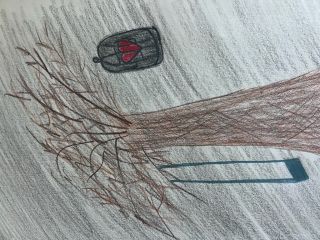Dissociation
Unmasking Ritual Abuse, DID, and the Threat of Suicide
On Dissociative Identity Disorder and suicide awareness.
Updated September 27, 2023 Reviewed by Monica Vilhauer Ph.D.
Key points
- Ritual abuse is a seldom-discussed and deeply unsettling topic.
- Dissociative Identity Disorder is highly stigmatized, and denying the existence of DID is of global concern.
- Secrecy perpetuates ritual abuse, and awareness is essential for prevention.
Ritual abuse, often relegated to the shadows of discourse, remains a subject shrouded in disbelief and misunderstanding. This enigmatic issue intersects with Dissociative Identity Disorder (DID), a highly stigmatized mental health condition that itself faces skepticism about its legitimacy. As we navigate this challenging terrain, we confront the fact that academia and mainstream depictions often sensationalize dissociative disorders while ignoring the complexities of child abuse memories. This lack of open-mindedness stifles discussions, training, and research on the profound impact of child abuse, including dissociation and dissociative disorders, as revealed in research by Brand, Schielke, Schiavone, and Lanius in 2022.
Melissa Parker, a clinician with personal and professional experience with DID, aptly noted inside Dr. Jamie Marich’s Dissociation Made Simple (2023), "Our stories have been written by people who know nothing about us." Hence, the rallying cry among the global DID community emerges: "Nothing about us without us." As a psychologist living with DID and equipped with both lived and professional experience, I have personally suffered due to the mental health and medical field's limited understanding of DID. At one point, I teetered on the brink of losing my life because of it. My urgent plea to the global community, encompassing the public, providers, academics, researchers, and the media, is to embrace knowledge and understanding about DID. A promising starting point is to acquaint oneself with An Infinite Mind: The International Organization on DID.
Defining Ritual Abuse (RA)
Ritual abuse fuses the concept of a ritual—a structured procedure to attain a transformation—with the malevolent nature of abuse, which encompasses any act that harms an individual's physical, emotional, sexual, mental, or spiritual development. It's crucial to grasp that ritual abuse is systematic and engineered to break a person's will.

The Impact of Trauma on the Victim
Dr. Judith Herman, the author of Trauma and Recovery, underscores the centrality of secure connections with caring individuals in shaping one's personality. When these connections shatter due to trauma, a person's foundational sense of self fractures. Herman further asserts that a child's positive self-esteem relies on a caregiver's benevolent use of power. Abuse, which violates a person's autonomy at the core, induces a cascade of emotional reactions including shame and self-doubt. These emotions often resurface following traumatic events, perpetuating self-doubt.
Chrystine Oksana, in Safe Passage to Healing: A Guide for Survivors of Ritual Abuse (2001), elucidates that ritual abuse manifests in diverse forms, driven by various motivations such as religion, preoccupation with the supernatural, power, financial gain, or sadomasochistic drives. Disturbingly, it often intertwines with the underworld of prostitution, pornography, and trafficking. I, too, fell victim to ritual abuse as a result of my father’s involvement in organized crime.
Programming in the Alters/Parts of a DID System That Has Endured RA
One disturbing facet of my ordeal was the "programming" of certain parts of my identity, compelling them to perform specific actions based on the rituals imposed upon me. This included programming parts to contemplate suicide for "telling" or breaking the code of silence.
The Role of Clinicians
For clinicians working with DID clients, especially when the abuse history is concealed initially, it's imperative to acknowledge that survivors may harbor parts programmed to return to abusers or inflict self-harm. This heartbreaking reality underscores the necessity for all practitioners claiming to be "trauma-informed" to possess a deep understanding of Dissociative Identity Disorder.
Awareness and Validation
To combat ritual abuse, we must first acknowledge its existence. Like incest, ritual abuse thrives in secrecy, and survivors can only heal when society grants them recognition and validation. Similarly, the denial of DID's existence leaves countless people suffering and, in some cases, facing the specter of suicide.
This blog serves as an introductory exploration of ritual abuse, Dissociative Identity Disorder, and the alarming risk of suicide. To delve deeper into these critical subjects, consult the reference section to expand your knowledge and compassion.
In memory of "Marie and Layla," may their stories inspire greater awareness and action.
Inspired by friends and partners of those impacted by RA & Stigma.
Note: The information in this blog is not a substitute for professional mental health or medical care. It is provided for educational and informational purposes only. If you or someone you know is in crisis, please contact the National Suicide Prevention Lifeline by texting 988.
References
Brand, B., Schielke, H., Schiavone, F., Lanius, R. (2022) The Finding Solid Ground Program Workbook: Overcoming Obstacles in Trauma Recovery. Oxford University Press, New York, NY.
Herman, J. (2015). Trauma and recovery. Basic Books.
Marich, J. (2023). Dissociation Made Simple: A Stigma Free Guide To Embracing Your Dissociative Mind and Navigating Daily Life. North Atlantic Books
Oksana, C. (2001). Safe Passage to Healing: A Guide for Survivors of Ritual Abuse. Backinprint.com Edition. Originally published by HarperPerennial
Additional Resources:
An Infinite Mind: The International Organization on DID, Founder Jaime Pollack, MED, ITSD
Larry Ruhl, Artist, Author, Speaker, & Survivor
Author of Breaking the Ruhls, a Memoir
https://www.breakingtheruhls.com/
Olga Trujillo, JD, Attorney, Author, Speaker, & Survivor
Author of Sum of My Parts a Survivor Story of Dissociative Identity Disorder
https://www.linkedin.com/in/olga-trujillo/
Melissa(s) Parker, LMHC,
https://www.centerpsychotherapy.com/
Meg(s) Hawkins, Artist, Speaker, Entrepreneur & Survivor
@brushstrokes_imagination on Instagram
The Plural Association
https://thepluralassociation.org/
**You can locate additional resources under the resource section of An Infinite Mind's website
Resource on DID & RA:
Cristina Mardirossian, LMFT of Pasadena Trauma Therapy
https://pasadenatraumatherapy.com/about/cristina-mardirossian/
Resource on Suicide:
American Foundation of Suicide Prevention
https://afsp.org/




